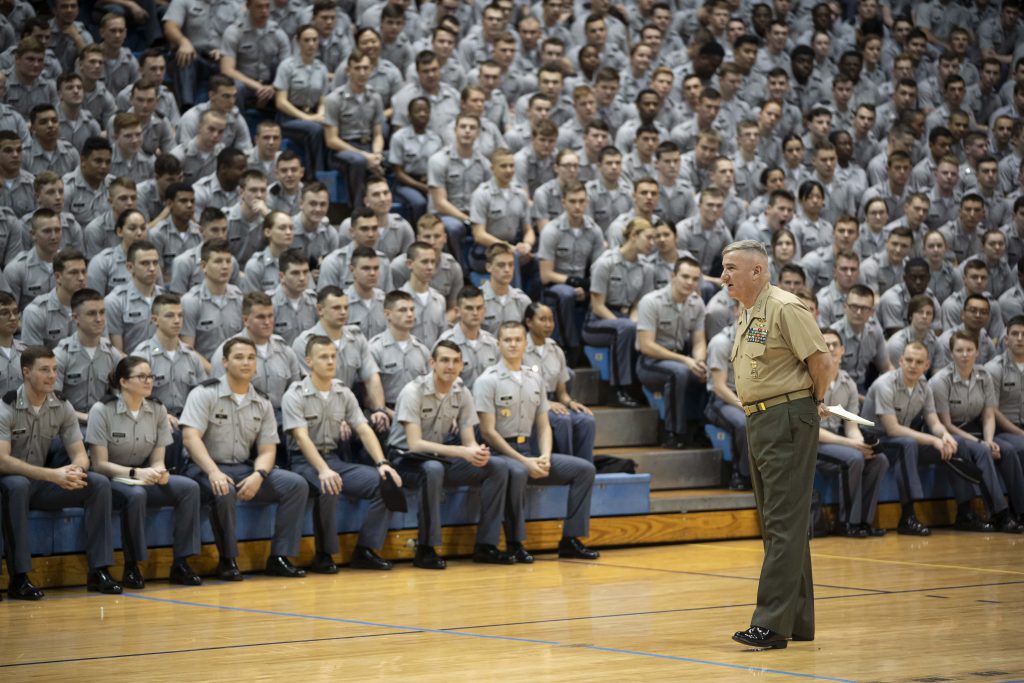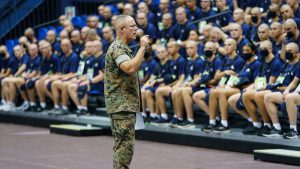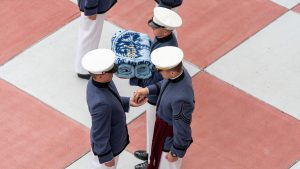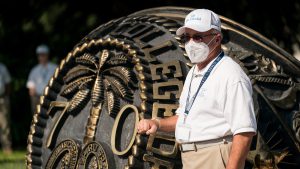
As seen in The Post and Courier
By Brian Hicks
Photo above: The Citadel President, General Glenn Walters, addresses campus regarding COVID-19 in March, 2020
A lot of folks are flat-out doing this pandemic all wrong.
They don’t keep their distance, refuse to stay home when possible and consider it an infringement on their “freedom” to wear a mask. After nearly a year of this madness, they still don’t understand they can unwittingly spread the virus to others.
Or they just don’t care.
Everybody gripes about these types, and with good reason. But today, let’s recognize some of those who are doing it right. There are thousands of people in this community who’ve helped minimize the virus’ spread and pitched in with key assists for everyone else — and they deserve our appreciation.
Let’s start with The Citadel.
As you might imagine, a military college with about 2,300 cadets living together in barracks has the potential to become a monumental petri dish.
As of Monday, the campus had just 18 positive cases in quarantine.
Col. John Dorrian, The Citadel’s vice president for communications and marketing, says the college unsurprisingly treated its efforts to fight the virus as a military campaign. And even as cases of COVID-19 have spiked in the Lowcountry and pretty much everywhere else, Operation Fall Return has been an astonishing success.
Like most colleges, The Citadel went online in March but was determined to get students back on campus for the fall because, well, that’s sort of the point of being in the Corps of Cadets.
They sacrificed some traditions — no parades, for instance — and limited off-campus leave. Cadets divide their time between in-person and virtual instruction, and they are subject to weekly, random COVID testing. And, because it could, the college made masks a mandatory part of cadet uniforms.
The college learned a lot about containing the virus over the summer when the Marine Corps used the campus as a staging area for new recruits headed to Parris Island. Ultimately, The Citadel spent months preaching a pretty simple suggestion that many others can’t seem to get through their heads.
“If you follow CDC (Centers for Disease Control and Prevention) recommendations, they work,” Dorrian says.
If only everyone employed such common sense.
Unlike some people, the Corps of Cadets (to use another military term) has “embraced the suck.” They know this isn’t an ideal situation, but they’re doing what has to be done to remain on campus and maintain some semblance of normal.
There’s a lesson there.
A number of local businesses have shown that same fighting spirit. Last week, at a virtual version of its annual Industry Appreciation Luncheon, Charleston County’s Economic Development Department saluted some local businesses that have responded to this crisis like patriots.
Brackish, the company that makes those snazzy bow ties, and Kate McDonald Bridal, which makes wedding gowns, put their seamstresses to work making face masks for front-line health care workers at the beginning of the pandemic (when those were in short supply).
Extremiti3D made face masks and anti-fogging face shields for nonmedical use. The Bourne Group made face shields for health care workers. And Multiplastics not only made face shields, but clear dividers and partitions for schools, churches and businesses around the state.
Summit Worx reconfigured its manufacturing operations to make air purifying respirators for FEMA, which sent them to hospitals dealing with the worst coronavirus outbreaks.
You may remember High Wire Distilling, in collaboration with Palmetto Brewing, manufactured sanitizer when there was a shortage early in the pandemic. Turns out they distributed more than 5,000 gallons of sanitizer to fire stations, shelters and charities. And Life Industries Corporation manufactured FDA- and CDC-approved sanitizer for those who couldn’t use alcohol-based sanitizers.
Finally, Limehouse Produce donated 1,200 boxes of fresh fruits and vegetables to the Lowcountry Food Bank in the early weeks of the pandemic, and has since worked with local hospitals to feed people who need it most.
Steve Dykes, the county’s executive director of economic development, says these companies are nothing short of inspiring, a credit to the county.
“Our businesses and community came together to respond to challenging circumstances, drawing upon the resiliency, generosity and grit that have always been at the core of this region,” Dykes says.
And that brings us back to a lesson that Dorrian says The Citadel has taught its entire campus: “It’s really not about you, it’s about everybody else.”
If only that sentiment spread as easily as the virus.

 Returning to campus: instructions from the Commandant of Cadets
Returning to campus: instructions from the Commandant of Cadets Preparing for Parents’ Weekend 2021
Preparing for Parents’ Weekend 2021 The rewind: celebrating the Class of 1970 and more
The rewind: celebrating the Class of 1970 and more

